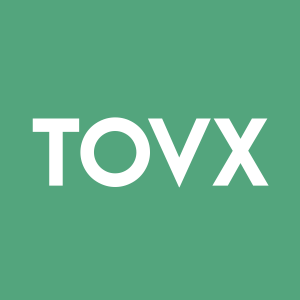Theriva™ Biologics Announces Primary Endpoints for Efficacy and Safety Achieved in VIRAGE Phase 2b Clinical Trial of VCN-01 with Gemcitabine/nab-Paclitaxel in Newly-Diagnosed Metastatic Pancreatic Cancer Patients
Rhea-AI Summary
- Progression-free survival improved to 7.0 months vs 4.6 months in control group
- Duration of response doubled to 11.2 months vs 5.4 months in control group
- Patients receiving 2 doses of VCN-01 showed even better results with 14.8 months overall survival
- Treatment was well-tolerated with manageable side effects
Positive
- Significant improvement in overall survival to 10.8 months vs 8.6 months in control group (HR=0.57)
- Doubled duration of response to 11.2 months vs 5.4 months (HR=0.22)
- Enhanced progression-free survival to 7.0 months vs 4.6 months (HR=0.55)
- Better results in patients receiving 2 doses (14.8 months OS vs 11.6 months)
- FDA Fast Track and Orphan Drug Designations already granted
- Well-tolerated safety profile with manageable adverse events
Negative
- Some adverse events reported including pyrexia, flu-like illness, vomiting, nausea, and elevated transaminases
- Phase 3 confirmatory trial still needed for potential approval
News Market Reaction
On the day this news was published, TOVX declined 40.44%, reflecting a significant negative market reaction.
Data tracked by StockTitan Argus on the day of publication.
- Patients treated with VCN-01 (zabilugene almadenorepvec) plus gemcitabine/nab-paclitaxel standard-of-care (SoC) chemotherapy had increased overall survival, progression free survival, and duration of response compared to patients treated with gemcitabine/nab-paclitaxel SoC -
- VCN-01 was well-tolerated, with transient and reversible adverse events (AEs), meeting primary safety endpoint -
- Greater differences between the treatment arms were observed in patients receiving 2 doses of VCN-01 -
- Data to be reviewed during a Key Opinion Leader webinar Featuring Dr. Manuel Hidalgo Medina and Dr. Mike Pishvaian on Wednesday May 7th, 2025 at 0800 US EDT -
ROCKVILLE, Md., May 07, 2025 (GLOBE NEWSWIRE) -- Theriva™ Biologics (NYSE American: TOVX), (“Theriva” or the “Company”), a diversified clinical-stage company developing therapeutics designed to treat cancer and related diseases in areas of high unmet need, today announced positive topline outcomes from the VIRAGE Phase 2b clinical trial evaluating the Company’s lead product candidate VCN-01 (zabilugene almadenorepvec) plus standard-of-care (SoC) chemotherapy gemcitabine/nab-paclitaxel as a first line therapy for patients with metastatic pancreatic ductal adenocarcinoma (PDAC) for whom gemcitabine/nab-paclitaxel is the recommended first-line treatment option. VCN-01 is a systemically-administered, tumor selective, stroma-degrading oncolytic adenovirus that has been granted Orphan Drug Designation and Fast Track Designation by the U.S. Food and Drug Administration (FDA) for the treatment of pancreatic cancer.
The analysis of the VIRAGE trial (see “About VIRAGE” below) includes data for first-line treatment of 96 newly-diagnosed metastatic PDAC patients:
- In the primary endpoint analysis, the 48 patients treated with at least one dose of gemcitabine/nab-paclitaxel SoC had a median overall survival (OS) of 8.6 months, while the 48 patients treated with VCN-01 followed by at least one dose of gemcitabine/nab-paclitaxel SoC had a median OS of 10.8 months [Hazard Ratio (HR) = 0.57,
95% CI 0.34-0.96, p=0.0546]. - The improvements in OS in the VCN-01+SoC treatment arm compared to the SoC control arm were reflected in increased progression free survival (PFS) [median PFS 7.0 vs 4.6 months; HR = 0.55,
95% CI 0.34-0.88, p= 0.0105]. - The median duration of response (DoR) was 5.4 months (n=15) in the SoC control arm, while the median DoR in the VCN-01+SoC treatment arm was doubled to 11.2 months (n=19, HR = 0.22,
95% CI 0.08-0.62, p=0.0035).
The increase in OS was greater for patients who received 2 doses of VCN-01 and 4 or more cycles of gemcitabine/nab-paclitaxel SoC (n=34) compared with patients who received 4 or more cycles of gemcitabine/nab-paclitaxel SoC (n=29) [median OS 14.8 and 11.6 months respectively; HR=0.44,
“The exciting topline data from the VIRAGE Phase 2b trial demonstrate the potential opportunity for VCN-01 to benefit metastatic PDAC patients treated with gemcitabine/nab-paclitaxel SoC chemotherapy.” said Steven A. Shallcross, Chief Executive Officer of Theriva Biologics. “The significantly reduced hazard ratios for survival parameters in the VCN-01 treatment group provide compelling evidence that VCN-01 in combination with gemcitabine/nab-paclitaxel may extend the lives of metastatic PDAC patients. These data, combined with recent advice from the U.S. FDA and the European Medical Agency, are expected to facilitate engagement with industry partners and enable the design of a Phase 3 confirmatory trial that, if successful, may deliver an important new therapeutic option for patients suffering this rapidly fatal disease.”
As previously reported, the VCN-01 adverse event (AE) profile was consistent with that observed in prior clinical trials. The most common VCN-01 related AEs (pyrexia, flu-like illness, vomiting, nausea, and elevated transaminases) were transient and reversible. These AEs were observed to be less frequent and of reduced CTCAE grade after the second VCN-01 dose (administered on day ~92) compared to the first VCN-01 dose (administered on day 1). A review by an Independent Data Monitoring Committee noted that the overall type and number of AEs in the VCN-01 treatment group was as expected for the pancreatic cancer population, the duration of treatment, and the administration of an oncolytic virus.
Theriva will host a live virtual event to review and discuss the data from the VIRAGE trial of VCN-01 on Wednesday, May 7th 2025, 8:00 AM EDT. The virtual event will feature eminent pancreatic cancer clinician/researchers Dr. Manuel Hidalgo Medina MD PhD (Chief, Division of Hematology and Medical Oncology, Weill Cornell Medical College and Attending Physician, New York-Presbyterian Hospital) and Dr. Mike Pishvaian MD PhD (Director of Gastrointestinal, Developmental Therapeutics and Clinical Research Programs for the Johns Hopkins Kimmel Cancer Center and Associate Professor at the School of Medicine). To register for the event, click HERE.
About Pancreatic Ductal Adenocarcinoma
Cancer of the pancreas consists of two main histological types: cancer that arises from the ductal (exocrine) cells of the pancreas or, much less often, cancers may arise from the endocrine compartment of the pancreas. Pancreatic ductal adenocarcinoma (“PDAC”) accounts for more than
About VIRAGE
VIRAGE is a two-arm, Phase 2b open-label, randomized, controlled, multicenter clinical trial in patients with histologically confirmed, newly-diagnosed metastatic PDAC. Patients were enrolled at 5 sites in the U.S. and 9 sites in Spain. In both the control and VCN-01 (zabilugene almadenorepvec) treatment arms, patients received gemcitabine/nab-paclitaxel standard-of-care chemotherapy in repeated 28-day cycles until disease progression. In the VCN-01 treatment arm only, patients were also administered intravenous VCN-01 seven-days prior to starting the first and fourth cycles of gemcitabine/nab-paclitaxel treatment (study days 1 and ~92 respectively). Primary endpoints for the trial include overall survival and VCN-01 safety/tolerability. Additional endpoints include progression free survival, duration of response, and measures of VCN-01 biodistribution, replication, and immune response. The study was designed with
About VCN-01
VCN-01 (zabilugene almadenorepvec) is a systemically administered oncolytic adenovirus designed to selectively and aggressively replicate within tumor cells and degrade the tumor stroma that serves as a significant physical and immunosuppressive barrier to cancer treatment. This unique mode-of-action enables VCN-01 to exert multiple antitumor effects by (i) selectively infecting and lysing tumor cells; (ii) enhancing the access and perfusion of co-administered chemotherapy products; and (iii) increasing tumor immunogenicity and exposing the tumor to the patient’s immune system and co-administered immunotherapy products. Systemic administration enables VCN-01 to exert its actions on both the primary tumor and metastases. VCN-01 has been administered to over 140 patients to date in clinical trials of different cancers, including PDAC (in combination with chemotherapy), head and neck squamous cell carcinoma (with an immune checkpoint inhibitor), ovarian cancer (with CAR-T cell therapy), colorectal cancer, and retinoblastoma (by intravitreal injection). More information on these clinical trials is available at Clinicaltrials.gov.
About Theriva™ Biologics, Inc.
Theriva™ Biologics (NYSE American: TOVX), is a diversified clinical-stage company developing therapeutics designed to treat cancer and related diseases in areas of high unmet need. The Company’s subsidiary Theriva Biologics, S.L., has been developing a new oncolytic adenovirus platform designed for intravenous (IV), intravitreal and antitumoral delivery to trigger tumor cell death, improve access of co-administered cancer therapies to the tumor, and promote a robust and sustained anti-tumor response by the patient’s immune system. The Company’s lead clinical-stage product candidate is VCN-01 (zabilugene almadenorepvec), an oncolytic adenovirus designed to replicate selectively and aggressively within tumor cells, and to degrade the tumor stroma barrier that serves as a significant physical and immunosuppressive barrier to cancer treatment. Additional clinical stage assets include (1) SYN-004 (ribaxamase) which is designed to degrade certain commonly used IV beta-lactam antibiotics within the gastrointestinal (GI) tract to prevent microbiome damage, thereby limiting overgrowth of pathogenic organisms such as VRE (vancomycin resistant Enterococci) and reducing the incidence and severity of acute graft-versus-host-disease (aGVHD) in allogeneic hematopoietic cell transplant (HCT) recipients); and (2) SYN-020, a recombinant oral formulation of the enzyme intestinal alkaline phosphatase (IAP) produced under cGMP conditions and intended to treat both local GI and systemic diseases. For more information, please visit Theriva Biologics’ website at www.therivabio.com.
Forward-Looking Statement
This release contains forward-looking statements within the meaning of the Private Securities Litigation Reform Act of 1995. In some cases forward-looking statements can be identified by terminology such as “may,” “should,” “potential,” “continue,” “expects,” “anticipates,” “intends,” “plans,” “believes,” “estimates,” and similar expressions, and include statements regarding the exciting topline data from the VIRAGE Phase 2b trial demonstrating the potential opportunity for VCN-01 to benefit metastatic PDAC patients treated with gemcitabine/nab-paclitaxel SoC chemotherapy; the significantly reduced hazard ratios for survival parameters in the VCN-01 treatment group providing compelling evidence that VCN-01 in combination with gemcitabine/nab-paclitaxel may extend the lives of metastatic PDAC patients; and the data, combined with recent advice from the U.S. FDA and the European Medical Agency, being expected to facilitate engagement with industry partners and enable the design of a Phase 3 confirmatory trial that, if successful, may deliver an important new therapeutic option for patients suffering this rapidly fatal disease. These forward-looking statements are based on management’s expectations and assumptions as of the date of this press release and are subject to a number of risks and uncertainties, many of which are difficult to predict that could cause actual results to differ materially from current expectations and assumptions from those set forth or implied by any forward-looking statements. Important factors that could cause actual results to differ materially from current expectations include, among others, the ability of VCN-01 to benefit metastatic PDAC patients treated with gemcitabine/nab-paclitaxel; the ability of VCN-01 in combination with gemcitabine/nab-paclitaxel to extend the lives of metastatic PDAC patients; the data facilitating engagement with industry partners; the ability to confirm the potential therapeutic benefits of VCN-01 in a Phase 3 clinical trial and delivering an important new therapeutic option for metastatic PDAC patients; the Company’s ability to reach clinical milestones when anticipated including enrolling the expected number of patients in each trial; the Company’s product candidates, including VCN-01, demonstrating safety and effectiveness, as well as results that are consistent with prior results; the ability to complete clinical trials on time and achieve the desired results and benefits, continuing clinical trial enrollment as expected; the ability to obtain regulatory approval for commercialization of product candidates or to comply with ongoing regulatory requirements, regulatory limitations relating to the Company’s ability to promote or commercialize their product candidates for the specific indications, acceptance of product candidates in the marketplace and the successful development, marketing or sale of the Company’s products, developments by competitors that render such products obsolete or non-competitive, the Company’s ability to maintain license agreements, the continued maintenance and growth of the Company’s and VCN’s patent estate, the ability to continue to remain well financed, and other factors described in the Company’s Annual Report on Form 10-K for the year ended December 31, 2024 and its other filings with the SEC, including subsequent periodic reports on Forms 10-Q and current reports on Form 8-K. The information in this release is provided only as of the date of this release, and Theriva Biologics undertakes no obligation to update any forward-looking statements contained in this release on account of new information, future events, or otherwise, except as required by law.
For further information, please contact:
Investor Relations:
Kevin Gardner
LifeSci Advisors, LLC
kgardner@lifesciadvisors.com
617-283-2856
Source: Theriva Biologics, Inc.








